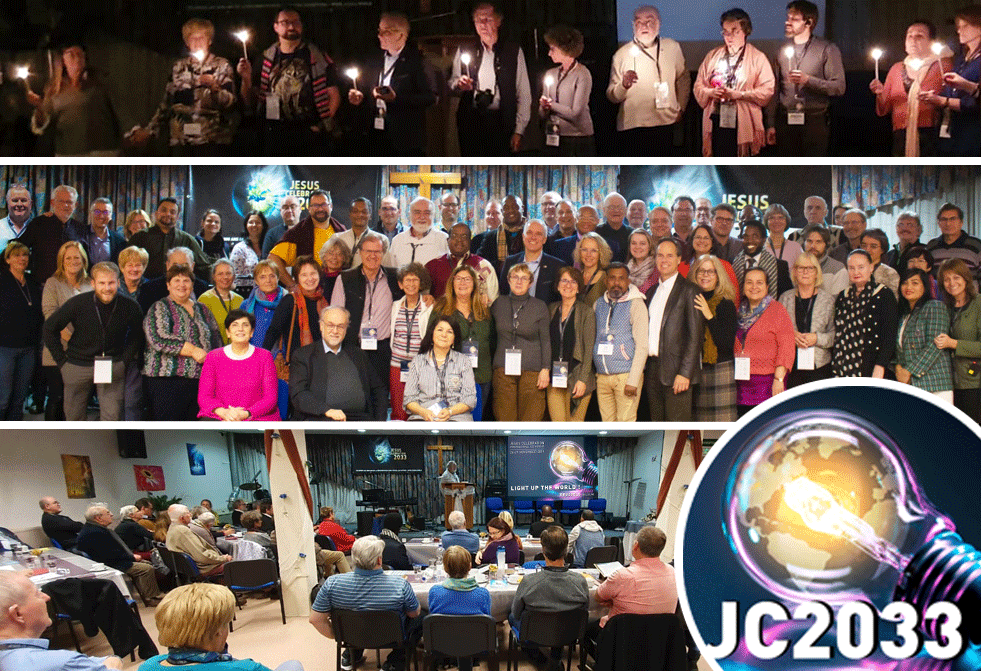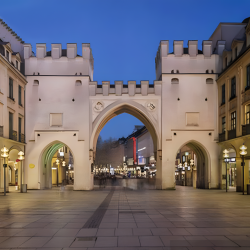He invited Pastor Peter Soltnau, the director of the Evangelical Alliance of Bavaria, to this meeting.
"This is an immense project," says the latter. "We must involve the Community of Churches of Bavaria and the Evangelical Alliance, in short, work with the whole spectrum of the churches. This initiative would be a good opportunity to develop their collaboration. "
He thinks that having a common goal and putting Christ and fraternity at the center, as in this initiative, allows us to move forward, with benevolence.
He also wants JC2033 to come up with ideas to help local churches, especially youth initiatives.
Ignite hearts
What is it that stirs Thomas Römer about this initiative? First, because the message of The Cross and the Resurrection is central. When it is announced something is happening. "To celebrate the Risen One is to ask him to act with force in our midst. It seems important to me not to celebrate a concept or an idea, the resurrection, but the risen Jesus who met the disciples on the road to Emmaus and set their hearts on fire. This is what I desire for all God's people: that the fire of love for Jesus and for one another burns in a new way." Römer insists on the need for reconciliation. If we want to celebrate together, it is essential that Christians reconcile. A celebration in 2033 will only be possible if there is reconciliation between the churches and the different streams of churches. Moreover, reconciliation is not only an ecclesial theme but also a society in which there are so many polarizations.
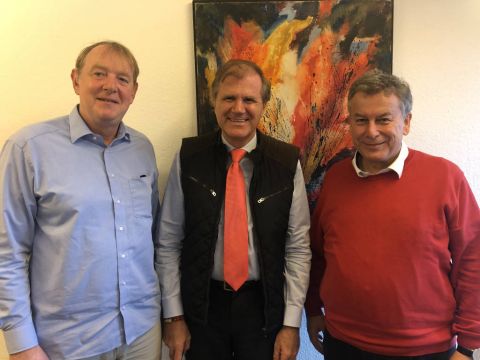 With Peter Soltnau and Thomas Römer
With Peter Soltnau and Thomas Römer
Through the network "Together for Europe", T. Römer has great experience with various churches and communities. According to him, we must name the beauty of other churches, tell them that they are a gift, love them their own church. We must also accept differences and deal with the things that bother us. He calls to encourage those responsible, because a love for Jesus also passes through love for them.
His concern is that everyone is involved in such an initiative. The atmosphere is currently good between the various churches of Munich. "We live in a special time, where the leaders are fraternal. The Holy Spirit challenges the taste of power and highlights love.”
Our plan to invite Christians to walk on the road to Emmaus is very pleasing to him. He proposes that we reflect on a path of Emmaus that could be lived everywhere, similar to the "Way of the Cross" (via crucis) found in Catholic churches.
"God can"
In St. Willibrod Church, which the Romanian Orthodox Church shares with the Old Catholic Church, I meet Fr. Alexandru Dan Nan, Dean of the Romanian communities in Bavaria. These are constantly growing: thirty thousand Romanian Orthodox live in Munich, 200,000 in Bavaria and one million in Germany.
After founding the communities of Chur and St. Gallen, he has lived in Munich for seven years.
In our secularized world, he thinks, it is essential that Christians come together. "In spite of all our differences, we must collaborate. Personally I have been greatly enriched by the ecumenical experience lived in Switzerland ".
For him, the resurrection is the most important message: without the announcement of the risen Christ, there would be no Church.
In 2017, a survey in Germany revealed that people believe in angels more than God and Jesus. Even if ultimately faith in the Risen One is a grace, churches must ask themselves if they are not partly responsible for this desertion of faith, because of their lack of conviction in the resurrection of Christ.
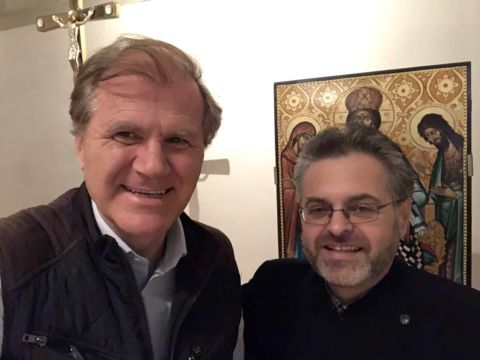 With le Fr. Alexandru Dan Nan
With le Fr. Alexandru Dan Nan
Fr. Alexandru invites his parishioners to pray for unbelieving people for a year. He published a pamphlet "God can". "We underestimate the importance of prayer for unbelievers. Yet it is thanks to the prayer of his mother that St. Augustine converted ", he confides to me.
This beautiful meeting ends with a time of prayer in the Church before the icons. The following day an ecumenical celebration will take place between the Orthodox, Anglican and Old Catholic Churches, on the occasion of the feast of St. Willibrod.
Healing wounds
Florian Schuppe, the head of the ecumenism of the diocese of Munich, welcomes me to the huge "Ordinariat", the recently renovated center of the diocese. He leads me first in the futuristic style chapel whose lines remind me of the Church of Ronchamp built by Le Corbusier.
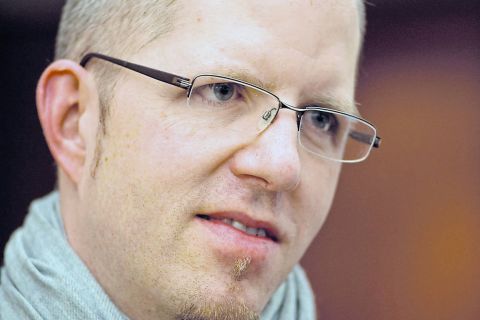 Florian Schuppe
Florian Schuppe
"The West has thought of salvation from the incarnation of Christ. The cross is the summit. But Orthodoxy has thought of man's rise to God, and the resurrection of Christ is the sign of it," he says to explain the centrality of the resurrection for it.
"The West has thought of salvation from the incarnation of Christ. The cross is the summit. But Orthodoxy has thought of man's rise to God, and the resurrection of Christ is the sign of it, "he says to explain the centrality of the resurrection for it.
For him, there is great strength in putting the resurrection of Christ in the center. A great chance to connect with each other. He is convinced that ecumenism needs these jubilee years. The Diocese of Munich has been involved in the 500 years of the Reformation, which has been a path of reconciliation. The strongest experience was a pilgrimage of church leaders in the Holy Land.
He welcomes with great care our invitation to a "decade of resurrection" in which the first seven years are a call to healing wounds and reconciliation.
For him, one of the important questions is how to understand mission and evangelism. Difficult experiences have been experienced between the Catholic Church and evangelical movements in Bavaria.
"The spiritual path you propose is realistic and I like it. So many stories of injuries are not told. The great strength of Christianity is to recognize them. It is even the duty of Christians. People look first and foremost at how we relate to each other. It is a great missionary strength.” He said.
A common direction for all!
Later, I meet her collaborator Esther Klein, responsible for relations with the spiritual movements in the diocese. "It is nice that you visit the leaders and invite them to ask the question already now. May this march towards 2033 become theirs! Not something more, but a common direction for all!” she tells me.
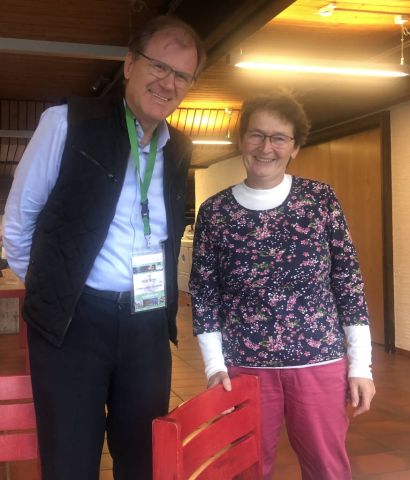 With Esther Klein
With Esther Klein
At noon, in the Dome district, in the Augustiner brewery, one of Munich's most popular restaurants, I meet Deacon Ralph Prausmüller, head of pilgrimages for the Diocese of Munich. We are discussing the possibility of publicizing the Ecumenical March on the road to Emmaus that we will do in January 2020, with the intention of proposing it every year until 2033.
Martin Hoegger


